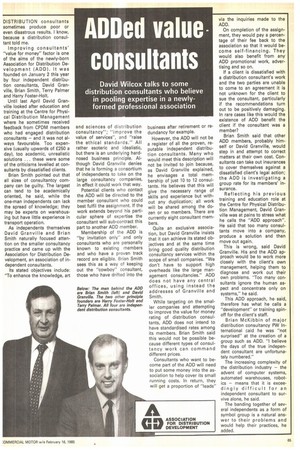ADDed value consultants
Page 67

If you've noticed an error in this article please click here to report it so we can fix it.
David Wilcox talks to some distribution consultants who believe in pooling expertise in a newlyformed professional association
DISTRIBUTION consultants sometimes produce poor or even disastrous results. I know, because a distribution consultant told me.
Improving consultants' "value for money" factor is one of the aims of the newly-born Association for Distribution Development (ADD). It was founded on January 2 this year by four independent distribution consultants, David Granville, Brian Smith, Terry Palmer and Harry Foster-Holt.
Until last April David Granville looked after education and training at the Centre for Physical Distribution Management where he sometimes received feedback from CPDM members who had engaged distribution consultants — and it was not always favourable. Too expensive (usually upwards of £250 a day), too academic, unrealistic solutions ... these were some of the criticisms levelled at consultants by dissatisfied clients.
Brian Smith pointed out that all sizes of consultantcy company can be guilty. The largest can tend to be academically oriented, he said, while the one-man independents can lack the spread of knowledge; they may be experts on warehousing but have little experience in transport operation.
As independents themselves David Granville and Brian Smith naturally focused attention on the smaller consultancy practice and came up with the Association for Distribution Development, an association of independent consultants.
Its stated objectives include: "To enhance the knowledge, art and sciences of distribution consultancy"; "improve the value of services", and "raise the ethical standards." All rather esoteric and idealistic, but there is an underlying hardnosed business principle. Although David Granville denies that he is forming a consortium of independents to take on the large consultancy companies, in effect it could work that way.
Potential clients who contact the ADD will be directed to the member consultant who could best fulfil the assignment. If the work extends beyond his particular sphere of expertise the consultant will sub-contract this part to another ADD member.
Membership of the ADD is "by invitation only" and only consultants who are personally known to existing members and who have a proven track record are eligible. Brian Smith sees this as a way of keeping out the "cowboy" consultant, those who have drifted into the business after retirement or redundancy for example.
However, the ADD will not be a register of all the proven, reputable independent distribution consultants. Many who would meet this description will not be invited to join because, as David Granville explained, he envisages a total membership of just 10 to 12 consultants. He believes that this will give the necessary range of skills and experience but with out any duplication; all work will be shared among the dozen or so members. There are currently eight consultant members.
Quite an exclusive association, but David Granville insists that it can achieve its stated ob jectives and at the same time bring good quality distribution consultancy services within the scope of small companies. "We don't have to support high overheads like the large man agement consultancies." ADD does not have any central offices, using instead the addresses of Granville and Smith.
While targeting on the smaller companies and attempting to improve the value for money rating of distribution consultants, ADD does not intend to have standardised rates among its members. Brian Smith said this would not be possible be cause different types of consultancy work can command different prices.
Consultants who want to become part of the ADD will need to put some money into the association to help cover its small running costs. In return, they will get a proportion of "leads" via the inquiries made to the ADD.
On completion of the assignment, they would pay a percentage of their fee back to the association so that it would become self-financing. They would also benefit from any ADD promotional work, advertising and so on.
If a client is dissatisfied with a distribution consultant's work and the two parties are unable to come to an agreement it is not unknown for the client to sue the consultant, particularly if the recommendations turn out to be positively damaging. In rare cases like this would the existence of ADD benefit the client if the consultant was a member?
Brian Smith said that other ADD members, probably himself or David Granville, would step in and attempt to correct matters at their own cost. Consultants can take out insurances to cover themselves against a dissatisfied client's legal action; the ADD is investigating a group rate for its members' insurance.
Reflecting his previous training and education role at the Centre for Physical Distribution Management, David Granville was at pains to stress what he calls the "ADD approach". He said that too many consultants move into a company, produce a solution and then move out again.
This is wrong, said David Granville. His and the ADD approach would be to work more closely with the client's own management, helping them to diagnose and work out their own problems. "Too many consultants ignore the human aspect and concentrate only on systems," he said.
This ADD approach, he said, therefore has what he calls a "development" or training spinoff for the client's staff.
Brian McKibbin of major distribution consultancy PW International c,-aid he was "not surprised" at the creation of a group such as ADD. "I believe the days of the true independent consultant are unfortunately numbered."
The increasing complexity of the distribution industry — the advent of computer systems, automated warehouses, robotics — means that it is exceedingly difficult for an independent consultant to survive alone, he said.
The banding together of several independents as a form of symbol group is a natural answer to their problems and would help their practices, he added.




























































































